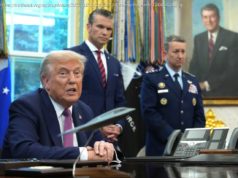South Korea’s military on Monday fired missiles into the sea to simulate an attack on the North’s main nuclear test site.
North Korea is „begging for war, “ and the United Nations must exhaust all diplomatic means to halt the expansion of Pyongyang’s nuclear program before it’s too late, U. S. Ambassador Nikki Haley said at an emergency meeting of the Security Council on Monday, one day after Pyongyang conducted its sixth and by far most powerful nuclear test.
„Enough is enough, “ Haley said. „We have kicked the can down the road long enough. There is no more road left.“
Haley dismissed „freeze for freeze“ proposals from China and Russia that call for North Korea to halt nuclear development in exchange for a halt in U. S.-South Korean joint military exercises and removal of a U. S. anti-missile system from the peninsula. She also sounded a recurring theme from the Trump administration — China could use its sway with Pyongyang to halt North Korea’s nuclear program.
„The United States will look at every country that does business with North Korea as a country that is giving aid to … reckless and dangerous nuclear ambitions, “ Haley said, in a reference to China. About 90% of North Korea’s foreign trade is conducted with China.
The U. N. has enacted a series of harsh economic sanctions over more than two decades that have left North Korea as one of the world’s poorest nations, yet have failed to halt Pyongyang’s drive to join the nuclear community.
South Korea responded to Sunday’s nuclear test by firing missiles into the sea Monday in a simulation of an attack on North Korea’s primary nuclear sites. Defense Minister Song Young-moo told a South Korean parliamentary session that the country’s leadership is leaning in „a direction that strengthens the military standoff, rather than… dialogue.“
The military said it fired a ground-to ground Hyunmoo ballistic missile and a long-range, air-to-ground missile from an F-15K fighter. Both missiles slammed into targets in the Sea of Japan. The simulated targets were designed to replicate the location of the North’s Punggye-ri nuclear test site.
The simulation came as South Korea’s National Intelligence Service warned its nation’s lawmakers that North Korea may be preparing to test another intercontinental ballistic missile, South Korea’s Yonhap news agency reported. The spy agency, in a closed session, warned that the test could be tied to the anniversary of the regime’s founding set for Saturday or the anniversary of the establishment of the ruling Workers‘ Party of Korea on Oct. 10.
North Korea flew a missile over northern Japan last week, the first such overflight by a missile capable of carrying nuclear weaponry. North Korean leader Kim Jong Un described that missile test as a “meaningful prelude” to containing Guam, home of major U. S. military facilities.
On Sunday, North Korea conducted its sixth nuclear test and first in almost a year. Pyongyang claimed it tested a miniaturized hydrogen bomb that could be transported on a ballistic missile. Details could not immediately be verified, but South Korean officials estimated the blast had a strength of up to 100 kilotons — several times more powerful than previous tests or the bombs dropped by the U. S. on two Japanese cities in World War II.
The test drew an angry response from the Trump administration, and Defense Secretary Jim Mattis warned of a „massive military response“ against North Korea.
„We have many military options, and the president wanted to be briefed on each one of them, “ Mattis said Sunday after meeting with Trump, adding that the U. S. was „not looking to the total annihilation“ of North Korea.
President Trump took to Twitter on Sunday, blasting Seoul for what he described as a policy of „appeasement“ and threatening to cut off trade with China for failing to use its influence with Pyongyang to stop the nuclear buildup.
China issued a statement condemning Pyongyang’s test but also termed Trump’s threat „unacceptable.“ Geng Shuang, a Chinese Foreign Ministry spokesman, said China was working to resolve the issue of nuclearization of the Korean Peninsula and did not deserve to be the subject of sanctions.






